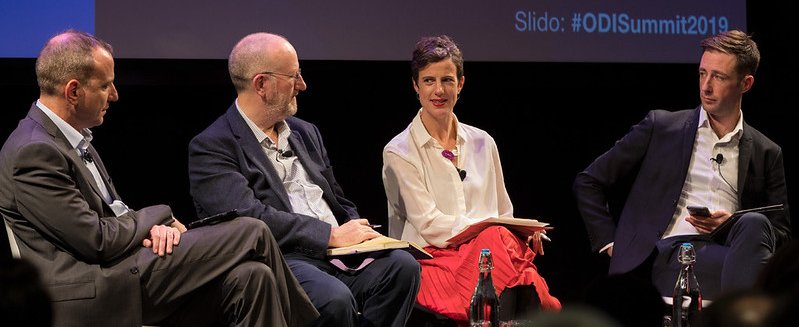
Do big technology companies holding large amounts of data provide invaluable services that make our lives better, or are they stifling innovation and showing that ‘big is bad’? Charlotte Mitchell, ODI’s Delivery Manager, shares what she learned from ‘Unlocking Digital Competition’ panel at the ODI’s 2019 Summit back in November.
The talk was chaired by Lawrence Kay, Senior Policy Advisor at the ODI and panelists included Catherine Miller, interim CEO at Doteveryone – which has helped to set social expectations for the regulation of frontier technology; Derek McAuley, Professor of Digital Economy, University of Nottingham – who was part of the UK’s Furman review; and Ariel Ezrachi, Slaughter and May Professor of Competition Law, University of Oxford.
Business as usual
Miller opened the discussion with a story about how she ran into a Facebook engineer during the 2018 Facebook and Cambridge Analytica scandal; when she asked what things were like in the wake of the storm he replied that nothing had changed. Despite being ordered to pay $5bn in fines for privacy violations by the Federal Trade Commission, Facebook’s share price didn’t even shiver. So, Miller questioned, why would an engineer be affected or feel that anything had changed?
At the start of 2019 there were 286 million data users in Europe, up four million from the previous year; showing that the number of users that are happy to accept and overlook the bad behaviour of online companies is increasing. Miller observed that “we are hooked, so why would Facebook feel that they need to do anything differently?”. She notes that “we can be appalled by the practice, stand up and berate the boss of a company that is behaving badly but nothing will change because no one feels that it needs to change”. Not only is there a lack of incentive to improve but also an imbalance of power between nationalgovernments and big companies like Facebook.
Bricks, mortar and… data?
Ezrachi explained that “there is a complete difference in competition when we are talking about competition in bricks and mortar, competition on the high street, and the dynamics of the competition you see online, what is referred to as virtual competition”. This means that one size does not fit all when it comes to competition law and what we are currently using to assess and govern virtual competition is clearly not fit for purpose.
Missing the target
Ezrachi also made the point that “the theories of harm that are used to address mergers between companies that are not really competing, but in neighbouring markets, do not take into account the value of data”. This is clearly shown by the recent acquisition of FitBit by Google – companies can be assessed as non-competing, but the value of the data that will be merged (and the potential impact and implications) by the union of the two companies is currently not considered. McAuley mentioned that Facebook, for example, have acquired no less than 78 companies, 17 of which were social media companies (including Instagram and Whatsapp), and many of these could have been considered competitors. He added that “no one asks if the merging of this data together is an issue in terms of data protection or privacy”.
The ambulance at the bottom of the cliff
It was universally agreed by the panel that competition law is currently reactive, rather than pre-emptive. McAuley pointed out that “we have to decide how we will behave upfront and change the basis on which we are regulating, it is no good slapping on the wrist once they have taken out the competition and it is too late”. The Furman report, which McAuley was part of, suggests getting in front of the problem rather than responding retroactively. Ezrachi went on to describe the current state of virtual competition law as “the ambulance at the bottom of the cliff” – our aim should be to stop ourselves from dropping off the cliff, but positioning the fence is a tricky task.
Individual vs society
Another interesting point made by Miller, was that capturing societal impact versus the impact on an individual is very challenging. An example she gave is: if Cambridge Analytica did use her data (something she may never find out) her “life has fundamentally not changed, however the impact on democracy where she lives has been profoundly affected”. She argued that “this demonstrates that the way we articulate harm on society is not fit for purpose”. McAuley also agreed that “we have not looked at benefit and harm”. Panelists agree that the current tools are not fit for purpose and McAuley proposed that “we need to move to a world in which we’re going forward with a set of principles rather than trying to catch up.''
Moving to mobility
With fewer and fewer companies controlling larger and larger shares of data, the ease and ability for users to move between data holders is at risk of being reduced and restricted; Ezrachi gave the example that everyone in the room has their data controlled by either Apple or Android. McAuley observed that “portability may be a right but what we really need is mobility” and went on to say that “data portability is currently a right, but by itself is not enough”. Incentives such as open banking have been designed to facilitate portability and encourage mobility within the industry. It is not always enough to create laws and regulations in isolation, sometimes they need carefully considered schemes and incentives to help achieve their intended goals.
No longer open
The internet was built on open standards, but McAuley pointed out that “most startups start out as open source, having a high level of interoperability. When they get taken out by big companies, this openness and interoperability is lost”. They join a growing silo and are forced to play by the rules of the acquirer, which restricts data sharing, ultimately reducing collaboration and innovation.